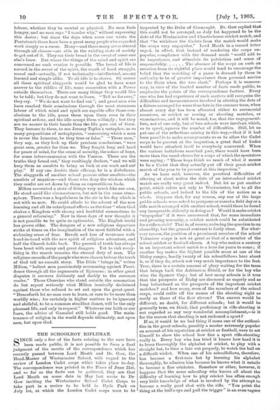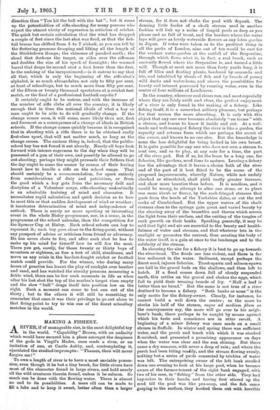inspected by the Duke of Connaught. Dr. Gow replied that
this could not be arranged, as July 1st happened to be the date of the Westminster and Charterhouse cricket match, and that "to withdraw the Cadets from the match. would make the corps very unpopular." Lord Meath in a second letter urged, in effect, that instead of rendering the corps un- popular, compliance with the demand made "would add to its importance, and stimulate its patriotism and sense of responsibility The absence of the corps on such an occasion from its rightful place would tend to encourage the belief that the watching of a game is deemed by those in authority to be of greater importance than personal service to the State when the two clash." Perhaps it is unneces- sary, in view of the limited number of facts made public, to emphasise the points of the correspondence further. Every one who has had experience of such matters will recognise the difficulties and inconveniences involved in altering the date of a fixture arranged for some time late in the summer term, when almost every day has been allocated either to ceremonial occasions, or cricket or rowing or shooting matches, or examinations, and it will be noted, too, that the engagement- lists, not of one only, but of two schools were involved, which, so to speak, squares the number of difficulties. Still, let us put one of the reflections arising in this way,—that if it had been possible to make arrangements so as to allow the Cadet corps to be present at the inspection, a great deal of kudos would have attached itself to everybody concerned. When the various battalions marched past, there would have been more than the usual cheers for a corps ofhi h w--C- the spectators were saying : "Those boys think so much of what it means to be a Cadet that they actually put off their great cricket match of the year to be present at this inspection."
As we have said, however, the practical difficulties of altering at short notice the date of an inter-school cricket match are really very great indeed. But let us put another point, which refers not only to Westminster, but to all the public schools, and indeed to the life of the nation as a whole. Suppose that, for any reason, any one of the large public schools were asked to postpone or cancel a field day or a rifle match arranged with another school, would there be found any insuperable difficulty in doing so ? Would it make cricket "unpopular" if it were announced that, for some immediate and pressing necessity, a cricket match could be substituted for a rifle match ? That is, of course, reducing the question to an absurdity, but the general contrast is fairly clear. For what- ever reason, the position of a prominent member of the school Volunteer corps is not so great as that of a member of the school cricket or football eleven. A boy who makes a century in an important school match is a hero for years to come ; if another boy makes the highest possible score at one of the Bisley ranges, hardly twenty of his schoolfellows hear about it, or if they do, attach not very much importance to the feat. True, there is a certain amount of glory waiting for the team that brings back the Ashburton Shield, or for the boy who wins the Spencer Cup ; but of how many schools is it true that the prospects of Bisley are discussed as eagerly and as long beforehand as the prospects of the important cricket matches ? and how many, even of the members of the school corps, could rattle off the names of the shooting eight as easily as those of the first eleven ? The answer would be different, no doubt, for different schools ; but it would be generally true, we think, that proficiency in rifle-shooting is not regarded as any very wonderful accomplishment,—is it for the reason that shooting is not reckoned a sport ?
If so, it would be no bad thing if some one of the authori- ties in the great schools, possibly a master extremely popular on account of his reputation at cricket or football, were to set himself to show the school how fine a sport rifle-shooting really is. Every boy who has tried it knows how hard it is to learn thoroughly the alphabet of cricket, to play with a straight bat, to time a late cut properly, to watch the ball on a difficult wicket. When one of his schoolfellows, therefore, has become a first-rate bat by learning his alphabet thoroughly, he admires him because he knows what it entails to become a fine cricketer. Somehow or other, however, it happens that the same schoolboy who knows all about the difficulty of learning how to play cricket has often enough very little knowledge of what is involved by the attempt to become a really good shot with the rifle. "Yon point the thing at the bull's-eye and pull the trigger" is an even vaguer direction than "You hit the ball with the bat " ; but it sums up the potentialities of rifle-shooting for many persons who expect the utmost nicety of expression in criticism of cricket. The quick but certain calculation that the wind has dropped a couple of feet since the last shot was fired, or that the fish- tail breeze has shifted from 5 to 7 o'clock, as you can tell by the fluttering pennons drooping and lifting all the length of the Stickledown Range; the shimmer of parched earth ; the cloud that darkens the target, or rides over the rifleman and doubles the size of his speck of foresight ; the warmed barrel that drops its second shot a foot lower than the first, to the undoing of the inexperienced,—is it untrue to say that all that, which is only the beginning of the rifle-shot's alphabet, is so much abracadabra not only to fifty per cent. at least of schoolboys, but to much more than fifty per cent. of the fifteen or twenty thousand spectators at a cricket test match, or the final of a professional football cup-tie ?
It certainly ought to be untrue, and with the increase of the number of rifle clubs all over the country, it is likely enough that in time the national ideals of what a boy or man ought to be able to do will gradually change. If the change comes soon, it will come, more likely than not, first and foremost as a consequence of a change of ideals in British schools. If the change comes quickly because it is recognised that in shooting with a rifle there is to be obtained really first-class sport, that will not matter much, so long as the change comes. The curious thing is, indeed, that the public. school boy has not found it out already. Nearly all boys look forward with intense eagerness to the day when they will be possessed of a gun of their own, and possibly be allowed to go out shooting; perhaps they might persuade their fathers that the day ought to come the sooner by reason of their having learnt how to handle a rifle on the school range. That should certainly be a recommendation, for apart entirely from considerations of duty and patriotism, or from the good which a boy gets from the necessary drill and discipline of a Volunteer corps, rifle-shooting undoubtedly is an admirable training of mind and character. It necessitates rapid calculation and quick decision as to how to meet this or that sudden development of wind or weather ; it inculcates determination of mind and independence of outlook. There is surely no more sporting or interesting event in the whole Bisley programme, nor, in a sense, in the programme of the school calendar, than the competition for the Spencer Cup at Bisley. Each school selects one boy to represent it; each boy goes alone to the firing-point, without any prospect of advice or criticism from friend or adversary. He has seven shots to fire, and after each shot he has to make up his mind for himself how he will fire the next. There you geb, surely, for those twenty or thirty boys of seventeen or eighteen, as fine a test of skill, steadiness, and nerve as any crisis in the hardest-fought cricket or football match could provide. For the winner, who during many hours of practice has learnt the play of sunlight over heather and sand, and has watched the streaky pennons measuring a fickle wind, there can be few such moments in life as when after his last shot the top of the marker's target rises empty and the slow "bull" drags itself into position low on the right. Such a moment can come to but one out of the thirty ; but to the others it will still be something to remember that once it was their privilege to go out alone to that firing-point to try to win one of the finest schoolboy matches in the world.











































 Previous page
Previous page